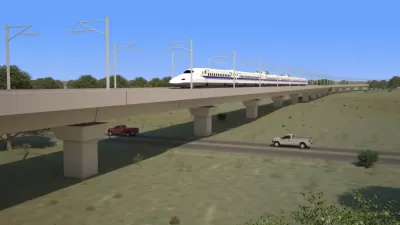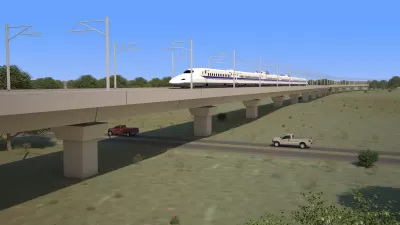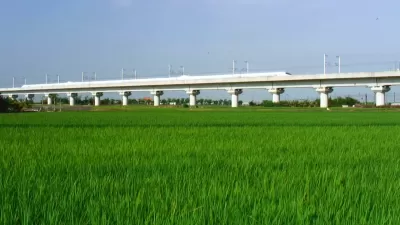The latest plan for the Texas Central high-speed rail line would stop trains well short of downtown Houston. Transit advocates are displeased with the change of plans.
"The area around U.S. 290 and Loop 610, anchored by Northwest Mall, is likely to be the end of the line for a proposed Houston-to-Dallas high-speed passenger train," reports Dug Begley. The implication there is that the proposed high-speed rail line will not come into downtown Houston, as once considered as a possibility.
"The Federal Railroad Administration has eliminated from consideration both paths that would have carried the trains to Houston's central business district," according to Begley. The decision not to bring the route into downtown is justified for the cost savings associated with avoiding the density and infrastructure in the downtown area. Begley surveys local voices on either side of the issue of bringing the trains into downtown, and also notes that the new "landing zone" for the line will likely provide a catalyst for growth in the Northwest Mall area.
Count Eric Jaffe of CityLab as one of the supporters of bringing the train into downtown. He wrote a column that describes the Federal Railroad Administration's decision to stop the route short of downtown a "troubling step back" after months of positive news.
Here, Jaffe lists some of the reasons why a downtown route might be preferable:
- "For one thing, it means HSR riders will have to connect to another mode of transportation to reach downtown Houston. At the moment, though, no such connection exists."
- "More broadly, conventional wisdom holds that HSR stations function better for city residents when they’re located downtown. That point was emphasized in a recent report by Eric Eidlin of the U.S. Federal Transit Administration on best practices from around the world."
FULL STORY: Planned high-speed rail line won't come downtown

Alabama: Trump Terminates Settlements for Black Communities Harmed By Raw Sewage
Trump deemed the landmark civil rights agreement “illegal DEI and environmental justice policy.”

Study: Maui’s Plan to Convert Vacation Rentals to Long-Term Housing Could Cause Nearly $1 Billion Economic Loss
The plan would reduce visitor accommodation by 25% resulting in 1,900 jobs lost.

Planetizen Federal Action Tracker
A weekly monitor of how Trump’s orders and actions are impacting planners and planning in America.

Waymo Gets Permission to Map SF’s Market Street
If allowed to operate on the traffic-restricted street, Waymo’s autonomous taxis would have a leg up over ride-hailing competitors — and counter the city’s efforts to grow bike and pedestrian on the thoroughfare.

Parklet Symposium Highlights the Success of Shared Spaces
Parklets got a boost during the Covid-19 pandemic, when the concept was translated to outdoor dining programs that offered restaurants a lifeline during the shutdown.

Federal Homelessness Agency Places Entire Staff on Leave
The U.S. Interagency Council on Homelessness is the only federal agency dedicated to preventing and ending homelessness.
Urban Design for Planners 1: Software Tools
This six-course series explores essential urban design concepts using open source software and equips planners with the tools they need to participate fully in the urban design process.
Planning for Universal Design
Learn the tools for implementing Universal Design in planning regulations.
Caltrans
Smith Gee Studio
Institute for Housing and Urban Development Studies (IHS)
City of Grandview
Harvard GSD Executive Education
Toledo-Lucas County Plan Commissions
Salt Lake City
NYU Wagner Graduate School of Public Service





























